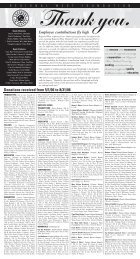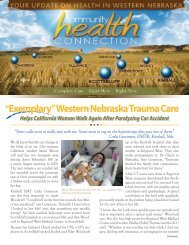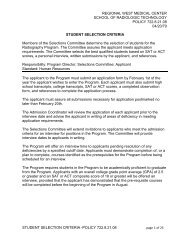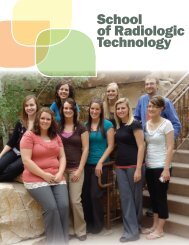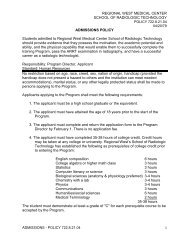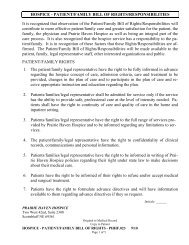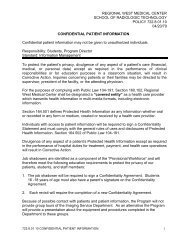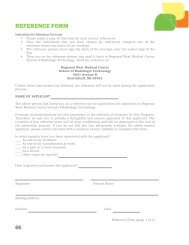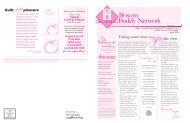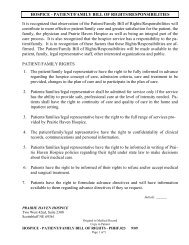Bosom Buddy Network one year later - Regional West Medical Center
Bosom Buddy Network one year later - Regional West Medical Center
Bosom Buddy Network one year later - Regional West Medical Center
Create successful ePaper yourself
Turn your PDF publications into a flip-book with our unique Google optimized e-Paper software.
B B<br />
NETWORK<br />
<strong>Bosom</strong><br />
<strong>Buddy</strong> <strong>Network</strong><br />
Fall 2006<br />
“No act of kindness, no matter how small, is ever wasted.”<br />
~Aesop~<br />
Check us out!<br />
on the web<br />
www.rwmc.net<br />
Click on ‘major hospital<br />
programs and units’ then click<br />
on ‘Cancer Treatment <strong>Center</strong>’<br />
this issue<br />
One <strong>year</strong> <strong>later</strong><br />
A husband’s perspective<br />
Living life to the<br />
fullest<br />
As a 24-<strong>year</strong> survivor<br />
The 2006 Festival<br />
of Hope<br />
Honoring memories and<br />
celebrating victories<br />
What’s new in cancer<br />
treatment?<br />
With Dr. Vince Bjorling<br />
Reflections of a sister<br />
survivor ...<br />
and not choosing breast<br />
reconstruction<br />
The pink rose<br />
Honoring a special volunteer<br />
Board members: Katy Hawkins,<br />
Becky Kreman, Cathie McRoberts,<br />
Ellen Ramig, Marletta Warner<br />
and Rae Whitney<br />
Editor: Teresa Clark<br />
<strong>Regional</strong> <strong>West</strong> Marketing & Public Relations<br />
The <strong>Bosom</strong> <strong>Buddy</strong> <strong>Network</strong> newsletter is<br />
written by cancer survivors - this is your<br />
newsletter. We value your input and appreciate<br />
feedback and articles relating to your<br />
breast cancer experience. To submit ideas<br />
and articles, please call Teresa Clark,<br />
<strong>Regional</strong> <strong>West</strong> Marketing and Public<br />
Relations Department, (308) 630-1687 or<br />
e-mail ttclark@charter.net.<br />
<strong>one</strong> <strong>year</strong> <strong>later</strong><br />
June 26th, 2005 is a day that<br />
will not soon be forgotten<br />
by my wife or me. Kelsey,<br />
my wife, was diagnosed<br />
with breast cancer. As most<br />
of you reading this article<br />
have experienced at some<br />
point, it is a jolt to<br />
your psyche like<br />
no other.<br />
I was at work<br />
when some<strong>one</strong><br />
from her work<br />
called and said I<br />
needed to come<br />
right away and<br />
seeing as how<br />
she had just<br />
had what was<br />
supposedly a<br />
fibroid adenoma removed<br />
the day before, I knew it<br />
could only be <strong>one</strong> thing. As<br />
we tried to come to terms<br />
with the news we had just<br />
been given, I was torn as to<br />
how I should approach it.<br />
Did my wife want the<br />
comforting arms of her<br />
husband or did she want<br />
the straightforward, ‘here<br />
is what we need to do’<br />
mentality of a radiation<br />
therapist?<br />
I tried as hard as possible<br />
to be very matter of fact<br />
initially, tried to give all the<br />
right answers and reassure<br />
her that it would be ok,<br />
which for quite a while was<br />
a hard thing for both of us<br />
to believe. Things had been<br />
moving so quickly up until<br />
the night before her surgery<br />
that we really had not had<br />
time to just be<br />
The Kriewald family<br />
together and let the situation<br />
actually set in. A lot<br />
of tears were shed that<br />
night and a lot of 'what ifs'<br />
were pondered, but looking<br />
back I think it was the night<br />
that started the healing<br />
process for us. We knew<br />
that the fight ahead of us<br />
would be long and tough,<br />
but that together we would<br />
get through it.<br />
Kelsey was the strength<br />
behind me being able to<br />
deal with everything and be<br />
supportive; her determination<br />
to get through surgery<br />
and chemotherapy was<br />
unwavering. She continues<br />
to remind me that I took<br />
off two weeks with a hernia<br />
surgery and she only took<br />
five days off after her<br />
mastectomy and on top of<br />
that she did eight cycles<br />
of chemotherapy<br />
at two-week intervals.<br />
I believe<br />
her comment to me<br />
was to go get some<br />
“estrogen.”<br />
We have two<br />
beautiful girls who<br />
also helped tremendously<br />
with making<br />
it through this whole<br />
process; our oldest,<br />
Kennedy, was just sure<br />
that Mom would have green<br />
hair after it came back following<br />
chemotherapy. They<br />
knew that Mommy was sick,<br />
but continued to go on with<br />
life knowing she would be<br />
better soon. It is now 14<br />
months since her diagnosis<br />
and things are going good.<br />
She is even more beautiful<br />
inside and out than before,<br />
which I didn't think was<br />
possible. In looking back on<br />
the last <strong>year</strong>, I find that<br />
when <strong>one</strong> of us was down<br />
(continued to page 6)
24twenty four <strong>year</strong>s of survival<br />
It always seems strange how things<br />
that happen, not necessarily in a split<br />
second, but in a short period of time,<br />
can make such a profound impact on<br />
us. For me that happened 24 <strong>year</strong>s<br />
ago.<br />
It started with a routine check-up<br />
with my gynecologist, Dr. Keller;<br />
when he asked if had felt any lumps<br />
in either breast, I said I only felt a<br />
place where it seemed “different." He<br />
thought since I was 47, I should have<br />
a baseline mammogram so I did. I<br />
guess my first clue came when the<br />
technician called in a radiologist. He<br />
looked at the film said that I should<br />
see a surgeon about a biopsy. That<br />
was my <strong>one</strong> and only mammogram.<br />
At that time I was, among other<br />
things, Director of Adult Basic<br />
Education at Nebraska <strong>West</strong>ern<br />
College, the previous name of<br />
<strong>West</strong>ern Nebraska Community<br />
College. I was responsible for the<br />
payroll of about 30 part-time<br />
employees at the middle and the<br />
end of each month. The biopsy<br />
was scheduled for the 1st of July;<br />
on June 30th, I did the payroll and I<br />
told my staff that I would be g<strong>one</strong><br />
the next morning but probably would<br />
be back after lunch.<br />
The next morning after the biopsy<br />
was finished, the surgeon said he<br />
would send the tissue to the lab;<br />
but he knew by looking at it that<br />
it was malignant. He scheduled a<br />
mastectomy and biopsy of the other<br />
breast for the next morning, I was<br />
admitted at that point, less than 24<br />
hours after I left my office. After<br />
the surgery, the news came that the<br />
second biopsy was also malignant<br />
and a second surgery was scheduled<br />
on the 6th of July.<br />
During the hospital stay, which was<br />
12 days, I first met Dr. Wil Packard.<br />
He came in on a Sunday morning<br />
and stayed a long time; we talked<br />
about lots of things, just getting<br />
acquainted. He told me first that my<br />
chances for a recovery were not very<br />
good. I remember thinking that if<br />
the chance of living five <strong>year</strong>s was<br />
only five percent, I'd have to figure<br />
out how to be in that five percent.<br />
But after a few more tests, with more<br />
positive results, he said things looked<br />
better and time has proven that he<br />
was right.<br />
After recovering from the surgery,<br />
the chemotherapy began the end of<br />
July with Ronda Kinsey administering.<br />
I really had a wonderful team on<br />
“Each week was harder and<br />
by the last couple of weeks, it<br />
was all I could do to get to the<br />
hospital, have the treatment,<br />
and get back home to bed.”<br />
—Jane Hunter<br />
my side! I was ready to go back to<br />
work after being g<strong>one</strong> six weeks<br />
when my father died of cancer, and I<br />
spent a week in Omaha. So after<br />
seven weeks, I certainly hadn't made<br />
it back “after lunch."<br />
Chemotherapy went pretty well for<br />
me. I was never sick to the point of<br />
vomiting, didn't lose all my hair, and<br />
never missed a day of work; but<br />
most of the time I felt like I had just<br />
eaten a bad oyster!<br />
The chemotherapy was scheduled for<br />
six months; after that period, Dr.<br />
Packard asked if it was OK with me<br />
to go for another three. Certainly, if<br />
that's what he thought, that's what I<br />
did. Then after a few weeks off, I<br />
started radiation for five weeks, five<br />
days a week. I don't know if it was<br />
the preceding chemotherapy or just<br />
my reaction, but I did less well with<br />
radiation. Each week was harder and<br />
by the last couple of weeks, it was all<br />
I could do to get to the hospital,<br />
have the treatment, and get back<br />
home to bed. I had a big stack of<br />
Rona Jaffe novels that month and<br />
made the best of it.<br />
During that <strong>year</strong>, I was blessed with a<br />
very supportive husband. He often<br />
cooked dinner, did the grocery shopping,<br />
and even changed bandages<br />
though he had been known to faint<br />
at the sight of blood! In recent <strong>year</strong>s,<br />
he has had several bouts with bladder<br />
cancer.<br />
Early in my <strong>year</strong>s as a cancer survivor,<br />
I was a volunteer for Reach<br />
for Recovery. I made many hospital<br />
visits under that program until the<br />
increased travel schedule in my job<br />
made that difficult. I still see women<br />
I visited here and there and it makes<br />
me feel good about both of us.<br />
So how did it change my life?<br />
Certainly there were lots of ways. In<br />
that opening chat with Dr. Packard<br />
he found out I had a dream of traveling<br />
to various places in the world;<br />
he even recommended that we take a<br />
trip, if we could, after the <strong>year</strong> was<br />
over. So we did. It also happened to<br />
be the summer of our 25th wedding<br />
anniversary so we celebrated that by<br />
taking a cruise in the Caribbean with<br />
a week in Barbados. Of course, I<br />
loved the whole thing and decided<br />
that as soon as both of our boys<br />
were finished with college, we would<br />
do some more major travel.<br />
In May of 1986, our younger son<br />
graduated from the University of<br />
Nebraska as his brother had d<strong>one</strong> the<br />
<strong>year</strong> before. So almost literally at that<br />
moment, I said to myself—Now it's<br />
my turn!<br />
(continued to page 4)<br />
2 ~ Fall 2006 BBN
festival<br />
the 2006<br />
OF HOPE<br />
Wishes, plans, faith and dreams.<br />
For cancer patients and their families,<br />
these are more than just words.<br />
With the annual Scottsbluff-area<br />
Festival of Hope and Sidney's<br />
Night of Hope, they also represent<br />
hope and optimism in the future.<br />
Honoring memories and celebrating victories<br />
area cancer patients and their<br />
families with daily living expenses<br />
that often mount during the treatment<br />
process. Funds can be used to<br />
pay for essential medication, travel<br />
expenses and insurance premiums<br />
as well as rent, car, home and other<br />
monthly payments.<br />
Now in its fifth <strong>year</strong>, the Night of<br />
Hope cancer walk has become a<br />
much-anticipated annual event in<br />
Sidney. Teams of walkers pitch their<br />
tents on the high school football<br />
field-making the night a community<br />
event while raising m<strong>one</strong>y and<br />
awareness for cancer. Since its<br />
beginning, Night of Hope events<br />
have raised over $60,000.<br />
“We want to help people out in a<br />
crunch so they are able to receive<br />
treatment while still meeting their<br />
daily living expenses," said Festival<br />
of Hope advisory board member<br />
and <strong>Regional</strong> <strong>West</strong> <strong>Medical</strong> <strong>Center</strong><br />
cancer specialist Vince Bjorling,<br />
MD.<br />
Organizers work with civic<br />
organizations, local pastors and<br />
<strong>Regional</strong> <strong>West</strong>'s Cancer Treatment<br />
<strong>Center</strong> to spread the word that<br />
m<strong>one</strong>y is available to those in need.<br />
According to Dr. Bjorling, the<br />
festival's future is encouraging. “I'm<br />
amazed every <strong>year</strong> by the festival's<br />
success," he said. “The committees,<br />
the chair people, the advisory board<br />
members and all of the volunteers<br />
have d<strong>one</strong> an incredible job to make<br />
something that is not only for a<br />
good cause, but is also fun and<br />
meaningful for the community. It<br />
fosters hope."<br />
<strong>Regional</strong> <strong>West</strong> <strong>Medical</strong> <strong>Center</strong> and<br />
Dorwart Cancer Care <strong>Center</strong> have<br />
participated as active event sponsors<br />
since the fundraisers began.<br />
Organized in 2003, The Festival<br />
of Hope raised over $100,000 in<br />
its third <strong>year</strong> al<strong>one</strong>. M<strong>one</strong>y raised<br />
during the festival goes to help<br />
To learn more about the Festival<br />
of Hope, contact Carol<br />
Diffendaffer at (308) 630-1535 or<br />
<strong>Regional</strong> <strong>West</strong>'s Cancer Treatment<br />
<strong>Center</strong> at (308) 630-1348. For more<br />
information about the Night of<br />
Hope, contact Leslie Biggs at the<br />
Dorwart Cancer Care <strong>Center</strong> at<br />
(308) 254-9192.<br />
Photos from top to bottom: CTC Assistant Director Jeff Kriewald counts down the butterfly release while Sarah and Danielle Pinet<br />
look on; A crowd of over 200 people watch on as the butterflies are released; Cancer survivor Norma Busch distributes balloons to the<br />
crowd.<br />
Fall 2006 BBN ~ 3
eflections reflections<br />
of a sister survivor<br />
It's exciting to find the latest<br />
“<strong>Bosom</strong> <strong>Buddy</strong> <strong>Network</strong>” issue in<br />
my mailbox...and I eagerly unfold it<br />
to read the deep-heart thoughts and<br />
reflections of my “sisters in survival”<br />
and be grateful once again for the<br />
loving concern lavished upon me<br />
by my dear family, friends and the<br />
medical community in my time of<br />
facing the terrors of breast cancer:<br />
the known of what treatments I was<br />
prescribed and the unknown of how<br />
I would cope emotionally and<br />
physically to them.<br />
Lest I ever tuck those days of detection<br />
and ensuing chemotherapy and<br />
radiation treatments away in my trunk<br />
of forgetfulness, I am impressed to<br />
reach out to newly diagnosed “sisters”<br />
who have entered into the realm of<br />
the unknown. Otherwise, what<br />
purpose has it served?<br />
While undergoing treatment, we<br />
continued in our bed & breakfast<br />
endeavor. At times I felt so “icky”<br />
that I simply couldn't greet our guests<br />
with the enthusiasm I needed, so my<br />
husband filled the gaps and I retired<br />
to our bedroom, only to come out<br />
to prepare breakfast and do behindthe-scenes<br />
chores. It's good to<br />
continue the routine of your life<br />
while in treatment in<br />
twenty four <strong>year</strong>s of survival<br />
(continued from page 2)<br />
Europe has been our destination<br />
many times but we have also g<strong>one</strong><br />
to South America; Australia; New<br />
Zealand; South East Asia including<br />
Hong Kong, Thailand, Ind<strong>one</strong>sia,<br />
Malaysia, the Philippines, Viet Nam;<br />
Japan; China; Korea; and Russia.<br />
Our only time in Africa has been<br />
a cruise stop in Morocco.<br />
Another thing that Dr. Packard talked<br />
about that Sunday morning was opera.<br />
At that point, I had never been to an<br />
4 ~ Fall 2006 BBN<br />
the best way your body allows, but<br />
I contend and advise that it is vitally<br />
important to listen to your body and<br />
be nice to it when it needs to rest, “no<br />
matter what!”<br />
It's been six plus <strong>year</strong>s since Dr.<br />
Johnson patted me on the knee as<br />
I lay on the table of that dark room<br />
and said he needed to look a little<br />
closer at the abnormality. I could see<br />
it on the screen and I was horrified.<br />
Now the only real reminder of those<br />
early days is when I am dressing each<br />
day and if I look into the mirror and<br />
contemplate what I looked like with<br />
breasts, I really don't feel any remorse<br />
or sorrow. The only <strong>one</strong>s who ever<br />
see me “in the buff ” are my beloved<br />
husband and yellow lab, and they<br />
both love me anyway! I strap my<br />
“Big Bertha” (as I call it) bra on (I<br />
chose the size!) and finish dressing<br />
and away I go!!! I admit when I work<br />
in the yard on a hot day, I don't take<br />
Bertha along - but the rest of the<br />
time I wear her in confidence and<br />
am grateful to have a prosthesis that<br />
I feel comfortable in. My close friends<br />
who have survived mastectomies have<br />
had reconstruction and I admire<br />
their tenacity in restructuring their<br />
anatomies. The choice is so very<br />
personal. Considering my age at<br />
diagnosis (64) and the fact that I<br />
opera but loved classical music and<br />
musical theatre so I thought I might<br />
like opera too. That has been another<br />
of my <strong>later</strong> life joys; going to live concerts<br />
and operas now, not waiting<br />
until <strong>later</strong>.<br />
Certainly it seems foolish to say that<br />
cancer was <strong>one</strong> of the best things that<br />
ever happened to me but in so many<br />
ways that's true. In the beginning<br />
<strong>year</strong>s, I was very conscientious of<br />
how important each day was and even<br />
after 24 <strong>year</strong>s, I still believe that. I<br />
think the cancer experience has also<br />
made me a more positive person. Life<br />
avoid pain at all costs, my husband<br />
and I chose to leave the scars as they<br />
were.<br />
And...oh, yes, to have hair again!!!<br />
Your breasts won't grow back, but<br />
your hair does...Praise God for that!<br />
Each day is a blessing. Having lost<br />
dear friends to the disease of cancer,<br />
I am indeed thankful to be allowed a<br />
measure of “borrowed time” here on<br />
earth. I pray that God will allow me<br />
continued opportunities to be an<br />
encourager of others who have<br />
entered into the frightening z<strong>one</strong><br />
of being called a “survivor.” I admit<br />
that a pain anywhere gives me a “knee<br />
jerk” reaction of “now it's back!!" but<br />
a quick prayer of trust in whatever<br />
God allows in my life and I can<br />
continue functioning without fear.<br />
The surviving is a process - <strong>one</strong> we<br />
wouldn't wish on ourselves or any<strong>one</strong>,<br />
yet in retrospect, have our lives not<br />
been enhanced in the journey? The<br />
sincere caring of the medical community,<br />
dear friends and family and other<br />
survivors and the deeper dependence<br />
on the Father are treasures I wouldn't<br />
trade.<br />
—Jane Snell<br />
Scottsbluff, Nebraska<br />
is too short to waste on being unhappy<br />
and bad-tempered. I find that I<br />
smile more often. On the other hand,<br />
I really treasure quiet times. I love to<br />
read a good book, look out a train<br />
window at the Alps, or sit on the deck<br />
of a cruise ship and watch the water<br />
go by.<br />
I have been very fortunate to be able<br />
to do those things. I have been fortunate<br />
to have a husband who wants to<br />
go with me. We have not put off<br />
much until tomorrow. We know what<br />
can happen to tomorrow.<br />
—M. Jane Hunter<br />
Scottsbluff, Nebraska
What’s<br />
new<br />
in breast cancer diagnosis<br />
and treatment?<br />
There will be over 210,000 new breast<br />
cancers diagnosed in the U.S. in 2006.<br />
There will also be approximately<br />
60,000 new cases of ductal carcinoma<br />
in situ diagnosed as well. These cases<br />
carry a very good prognosis since their<br />
chance of metastasis is very low.<br />
Overall, the prognosis and survival for<br />
breast cancer patients continues to<br />
improve due to the continuance and<br />
institution of newer technologies and<br />
treatments.<br />
With respect to diagnostics,<br />
wider usage of computer over-reading<br />
on mammograms can<br />
help radiologists pick<br />
up suspicious areas<br />
and point their attention<br />
to these areas. In<br />
addition, there is<br />
wider utilization of<br />
MRI for selected<br />
cases. This is used to<br />
look for multiple sites<br />
of disease prior to<br />
surgery when there is<br />
significant suspicion<br />
that that possibility exists.<br />
From the surgical<br />
standpoint,<br />
there is greater usage of sentinel node<br />
biopsies around the country. This helps<br />
the pathologist concentrate on the most<br />
important lymph nodes and examine<br />
them more closely. More importantly,<br />
sentinel node examination has dramatically<br />
decreased the incidence of complete<br />
axillary dissections, which has in<br />
turn decreased the incidence of lymphedema<br />
(arm swelling) in women.<br />
There continues to be advances in<br />
radiation therapy.<br />
It is believed that sometime<br />
in the future, the standard of<br />
FACT:<br />
There will be over<br />
210,000 new breast<br />
cancers diagnosed in<br />
the U.S. in 2006.<br />
care will allow women,<br />
who meet selected criteria,<br />
to have partial breast<br />
irradiation as a part of their<br />
therapy. This will decrease<br />
the amount of time they<br />
spend receiving radiation. This<br />
can be a benefit to those<br />
women who travel farther<br />
distances for radiation therapy.<br />
The biggest changes in<br />
chemotherapy have been seen<br />
in the adjuvant side. This is<br />
when we're treating women<br />
because they have<br />
an increased risk of<br />
breast cancer cells in<br />
their body but we<br />
don't know that for<br />
sure. One of the<br />
drugs to receive the<br />
greatest attention over<br />
the last <strong>year</strong> has been<br />
Herceptin.<br />
This drug is an antibody<br />
(a protein)<br />
that attacks a specific site on some<br />
breast cancer cells. The specific site is<br />
an antigen (a protein on the surface of<br />
the cancer cell) called HER-2. HER-2 is<br />
present in approximately 30 percent of<br />
breast cancers and its presence suggests<br />
a poorer diagnosis. The good news is<br />
that women whose cancers have the<br />
presence of HER-2 seem to have<br />
a much improved survival when<br />
Herceptin is added to the chemotherapy<br />
regimen. There is also a newer<br />
version of this drug which should<br />
be FDA approved in the near future.<br />
This drug is called TYK-erb and appears<br />
to be more effective than Herceptin<br />
The other big change in adjuvant<br />
therapy has been on the<br />
hormonal side.<br />
Aromatase inhibitors (Arimidex,<br />
Femara and Aromasin) are being<br />
used more frequently in the hormonal<br />
manipulation of women with breast<br />
cancer. These drugs can only be used<br />
in postmenopausal women. They<br />
work by shutting down the estrogen<br />
production from sites other than the<br />
ovaries (adrenal glands and fatty tissue).<br />
Compared to Tamoxifen (an estrogen<br />
receptor blocker), the aromatase<br />
inhibitors are a little more effective<br />
than Tamoxifen and are safer, with<br />
a decreased risk of blood clots and<br />
uterine cancer. The bad news is that<br />
the Aromatase inhibitors are harder<br />
on the b<strong>one</strong>s (promote osteoporosis)<br />
and are very expensive-approximately<br />
five to six times the cost of Tamoxifen.<br />
These drugs are going to play a significant<br />
role in the treatment of breast<br />
cancer for <strong>year</strong>s to come.<br />
I hope this has been helpful in<br />
explaining some of the new and<br />
positive things that are associated<br />
with the treatment of breast cancer.<br />
—Vince Bjorling, MD<br />
<strong>Medical</strong> Oncologist<br />
<strong>Regional</strong> <strong>West</strong> <strong>Medical</strong> <strong>Center</strong><br />
Scottsbluff, Nebraska<br />
Fall 2006 BBN ~ 5
the pink rose<br />
As each rose is unique and each petal's fragrance spreads hope,<br />
joy, courage and beauty to those around it, so it is with the special<br />
people who come into our lives.<br />
The Pink Rose is a new BBN tradition and <strong>one</strong> that we hope will grow and flourish<br />
through the <strong>year</strong>s. A Pink Rose is presented each issue to some<strong>one</strong> unique in<br />
herself/himself and who spreads their fragrance by helping others connected with<br />
breast cancer and/or survivorship.<br />
This fall the BBN board is thrilled to present<br />
a Pink Rose to Nancy Ravert. A breast cancer<br />
survivor and retired cosmetologist, she<br />
volunteers her time and energy in the Cancer<br />
Treatment <strong>Center</strong>'s Care and Share Salon and<br />
is also a Look Good…Feel Better volunteer.<br />
Thank you, Nancy, for all that you do!<br />
If you would like to nominate some<strong>one</strong> for a<br />
Pink Rose, please contact Teresa Clark at<br />
clarkt@rwmc.net or (308) 630-1687.<br />
Nancy Ravert styling a wig in<br />
the CTC Care & Share Salon.<br />
<strong>one</strong> <strong>year</strong> <strong>later</strong> (continued from cover)<br />
the other was up and we kept after the<br />
other <strong>one</strong> until we were both on the<br />
same page.<br />
I had hoped to provide some great<br />
piece of wisdom to all the spouses<br />
who read this article, but what I have<br />
to share you probably already know by<br />
now and that is women are amazingly<br />
strong people full of endless resolve.<br />
To get through the tough times you<br />
will definitely need each other, so<br />
ladies, allow yourself to be helped<br />
and guys, know when to help and<br />
when to leave well enough al<strong>one</strong>. It<br />
has been a pleasure to share our story<br />
and I wish every<strong>one</strong> reading this article<br />
many more <strong>year</strong>s of happiness; you<br />
are all amazing people.<br />
—Jeff Kriewald, BS, RT (R) (T)<br />
Assistant director, Cancer Treatment<br />
<strong>Center</strong> and Dorwart Cancer Care <strong>Center</strong><br />
<strong>Regional</strong> <strong>West</strong> <strong>Medical</strong> <strong>Center</strong><br />
Scottsbluff, Nebraska<br />
Although this newsletter does not endorse specific products, we strive to provide informational material which pertains to our readers. If you have information<br />
about clothing, wigs, prosthetics, or other tips that worked for you and you would like to share, please call Teresa Clark at (308) 630-1687.



